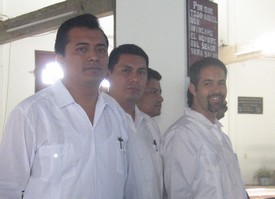 Our last post is nearly a month old, prompting many of you to start wondering, “Just what is going on with the Godzwa family?” Well after a week of vacation at the end of May, June hit with a fury named ISUM.
Our last post is nearly a month old, prompting many of you to start wondering, “Just what is going on with the Godzwa family?” Well after a week of vacation at the end of May, June hit with a fury named ISUM.
I’ve enrolled at ISUM or Instituto de Superación Ministerial (Ministerial Advancement Institute) which is a month long module of classes that allow Latin Ministers to work toward their college degree in theology. The work is intense. We start at 7:00 AM and finish at 1:30, but we also have group projects and homework, homework, homework. Most days I’ve been finishing at 11:30 or 12:00 at night.
Of course, the question that can come to mind during this routine is, “Why?” “Why would I spend a month sitting in a classroom and working toward a degree that I already have?” Part of it has to do with attitude. I have a Master’s of Divinity degree from AGTS with a concentration in Biblical Languages. It’s a pretty substantial degree, as was the time that it took in order to earn it. Still, if I’m content to sit back and tell myself that I’ve arrived and that there is nothing left to learn, then my degree isn’t worth the paper it is printed on.
I believe that one signal that a person has truly received an education is insatiable desire to learn more. When I entered Bible College, I wondered what it was that I really needed to learn, going on to seminary I thought that I had some adjustments to make if I were to really get a grasp on things. Now, after 8 years of study of the Bible, ministry, and theology, and a year of Spanish, I find that my knowledge is only scratching the surface of what I need to know in order to meet the demands of inter-cultural ministry. ISUM is another way to add to the resources that I have accumulated at the same time providing opportunity for me to experience a truly Latin American education, right down to the language (no English is spoken here!)
Beyond this is the “superación” that comes from being with those ministers that lead the fellowship of believers here in Mexico. The time spent hearing their stories, of working with them, and praying with them brings us a bond that visiting their church on a Sunday afternoon simply cannot. It leads us to an recognize and appreciate the calling that these ministers have on their lives, and it leads them to see the gifts and abilities that God has placed within each of us as missionaries. This interchange can only lead to enhanced cooperation and a greater effectiveness in ministry as we are called upon to compliment and extend the work that these men and women are undertaking.
So, you may see a bit less of me online in the next few weeks, but know that what is going on in the meantime will yield true value for our life and ministry here in Mexico.

 Monday arose with a day of work planned. We were to paint the pastor’s home as they were preparing to tear down the old house standing in the way of the construction of the church. The paint was bought and the team, using rollers, brushes, paint, elbow grease, and Christian camp songs began the work. Little by little the rough walls began to take on their new look. Here you can see Kelsey putting on the first coat. (Unfortunately for us, the paint we used on the first day was totally incorrect, leaving us to repaint what we had done over again, but that is for another post.)
Monday arose with a day of work planned. We were to paint the pastor’s home as they were preparing to tear down the old house standing in the way of the construction of the church. The paint was bought and the team, using rollers, brushes, paint, elbow grease, and Christian camp songs began the work. Little by little the rough walls began to take on their new look. Here you can see Kelsey putting on the first coat. (Unfortunately for us, the paint we used on the first day was totally incorrect, leaving us to repaint what we had done over again, but that is for another post.) About 9 days ago, I
About 9 days ago, I  If you’ve been looking at the Upcoming Events module, We’re nearly set to embark on our first missions team project. We’ll be headed south from Mérida to the small city of Muna. There, Kelly, the kids, and I, along with a group from America University’s
If you’ve been looking at the Upcoming Events module, We’re nearly set to embark on our first missions team project. We’ll be headed south from Mérida to the small city of Muna. There, Kelly, the kids, and I, along with a group from America University’s  We’ve certainly heard that line before. Whether we’ve used it or had someone use it on us, we know that something inappropriate had been said, something that didn’t fit in the conversation or context. Now, many of us would relate that unfortunate language to various four letter words that we may have heard throughout our lives, or perhaps to the childish giggles that accompany the use of “potty words” outside of their appropriate place, but today I’d like broaden the application of this phrase.
We’ve certainly heard that line before. Whether we’ve used it or had someone use it on us, we know that something inappropriate had been said, something that didn’t fit in the conversation or context. Now, many of us would relate that unfortunate language to various four letter words that we may have heard throughout our lives, or perhaps to the childish giggles that accompany the use of “potty words” outside of their appropriate place, but today I’d like broaden the application of this phrase.


